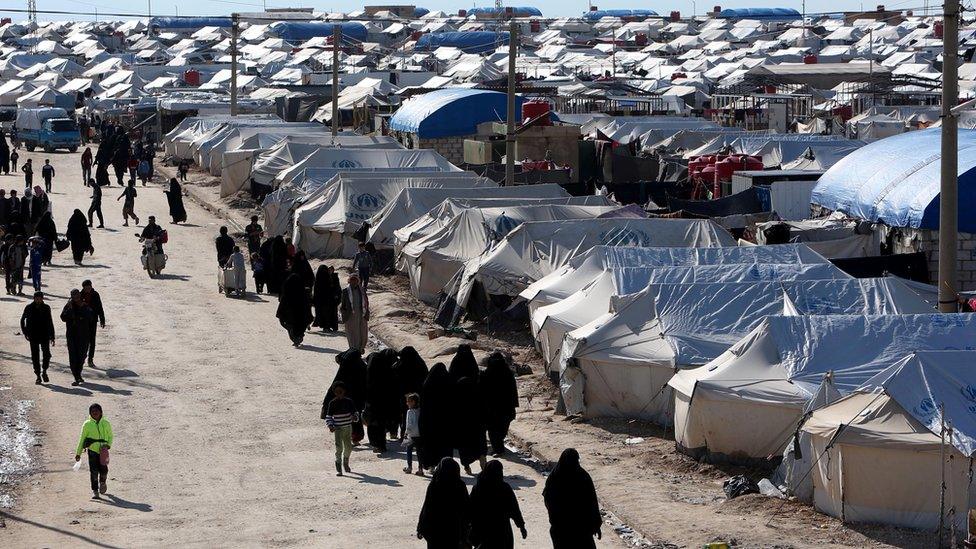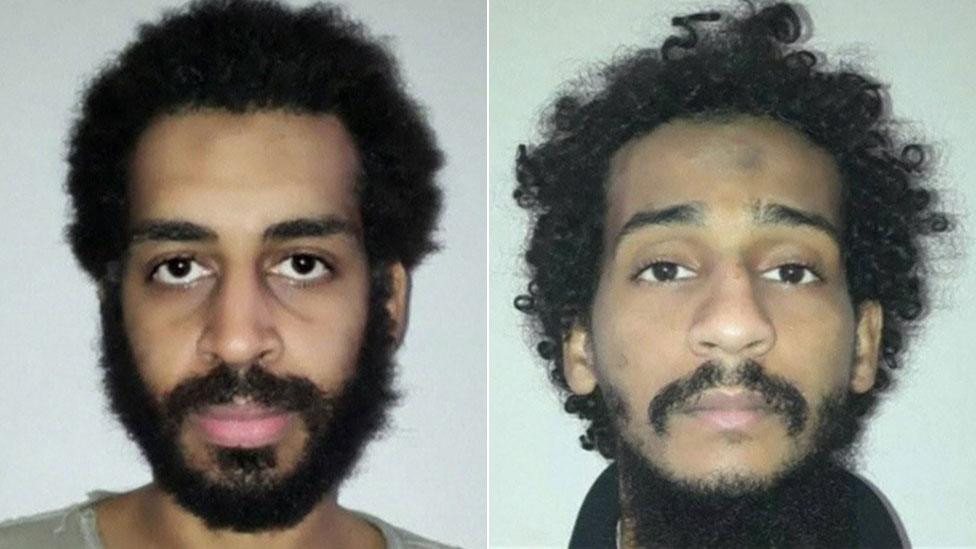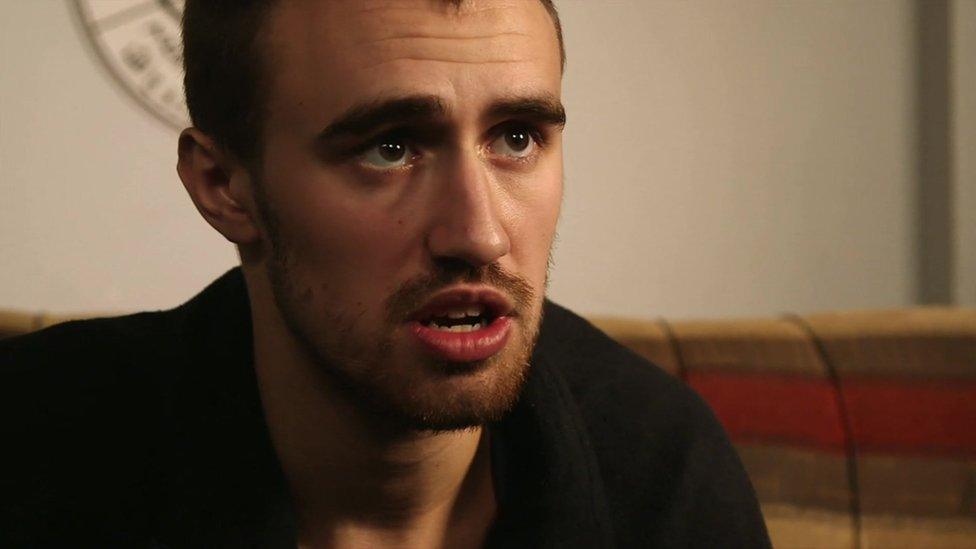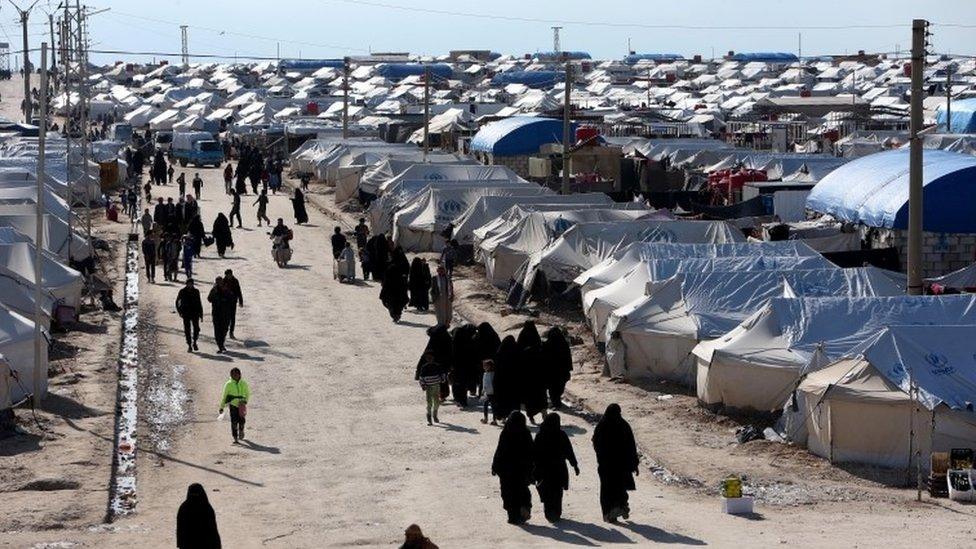UK 'has responsibility' to prosecute IS fighters
- Published

The failure to bring Britons who fought for the Islamic State group to justice in the UK is a "dereliction of responsibility", a top US counter-terrorism official says.
Since the fall of group's last Syrian stronghold, Baghuz, the US has stepped up efforts to get foreign fighters and their families repatriated.
But it is "frustrated" with the UK's failure to take back British fighters.
The Home Office says they should face justice wherever is "most appropriate".
This "will often be in the region where their offences have been committed," a spokesperson added.
Privately, however, UK officials have said they fear the legal minefield of trying some of the jihadists and are concerned that any failed prosecution might blow a hole in counter-terrorist legislation.
The issue of what to do with the human remnants of the "caliphate" is emerging as a thorny one for UK-US relations.
Fanned by public outrage, the British authorities appear to want as little to do with the detainees as possible.
"We're disappointed in a number of countries," Ambassador Nathan Sales, counter terrorism coordinator for the US State Department, told Newsnight.
"We think it's a dereliction of responsibility to expect the Syrian Democratic Forces to solve this problem or to expect the Iraqi government to solve this problem or to simply wash one's hands of the problem altogether," he said.
He praised Kosovo and Kazakhstan for taking back their detainees and added: "We've actually seen considerably more willingness to address this problem by some other countries that don't have the same resources and that don't have the same long-standing tradition of rule-of-law courts."
"Every country has a responsibility to take back its citizens and prosecute them."
Whitehall has already agreed that two of the most prominent British IS fighters, suspected of complicity in the kidnap and murder of Western hostages in 2014, should be extradited to face trial in the US.
The US was granted permission to try them by the UK government, after arguing that several of their victims were American.
Who were the Islamic State 'Beatles'?
Alexanda Kotey and El Shafee Elsheikh, from west London, were captured in Syria in 2018. They are accused of being part of an "execution cell" - dubbed "The Beatles" because of their UK accents.
However, the mother of Mr Elsheikh, Maha Elgizouli, has launched a challenge in the UK's Supreme Court arguing that the pair should be tried in the UK.
Mr Elsheikh and Mr Kotey have both been stripped of their British nationality, as has Shamima Begum - who ran away to join IS in 2015 with classmates Kadiza Sultana and Amira Abase.

Alexanda Kotey (left) and El Shafee Elsheikh were captured by Syrian Kurdish forces and extradited to the US
It is thought that that there are only around 12 other suspected IS fighters with UK nationality in custody in northern Syria, and even when wives and children are added the figure is less than 100.
The women and children are being held in a camp called al-Hol in a Kurdish-controlled part of Syria. The men are in more secure facilities.
It is believed that more than 70,000 people were taken into custody by US-backed forces in the area, so the UK total represents a very small proportion of the whole.
It's believed that some of the British-born wives and children have quietly returned home during the past couple of years.
Beyond their support for IS, these spouses may be innocent of any crime and their children are generally below the age of criminal responsibility.
'Dark future'
Aid agencies have expressed concern that al-Hol and other camps have become increasingly tense as militant pro-IS detainees have sought to control the rest.
Videos have recently appeared via jihadist outlets in which some of these detained women have described themselves as a "time bomb", who would seek to re-establish the caliphate.
A few weeks ago there was an attempted break out from one of the facilities holding male detainees. US and Kurdish officials fear that the situation could lead to an eruption of violence.
But there are longer-term fears too. Even if all western European countries took back their nationals, the US-backed Kurdish forces in northern Syria would still face a quandary about what to do with the tens of thousands of other IS sympathisers.
"You just need to see what's happening in the camps," Ali Soufan, a senior FBI counter-terrorism agent after 9/11 told the BBC. "If we don't do anything with these refugees and families, I think the future is going to be very dark."
You can watch Newsnight on BBC Two weekdays at 22:30 or on iPlayer, subscribe to the programme on YouTube, external and follow it on Twitter, external.
- Published21 June 2019

- Published24 June 2019

- Published22 October 2018
